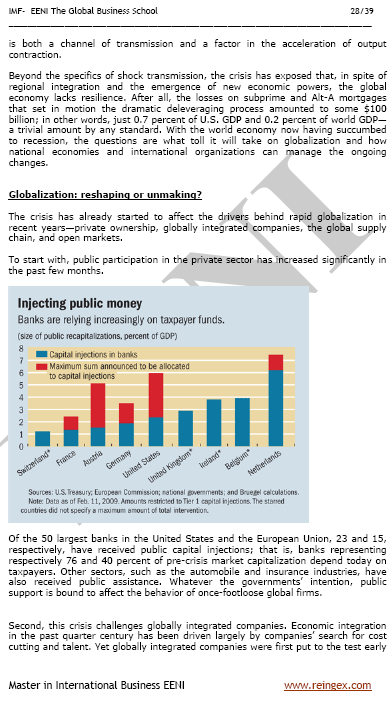International Monetary Fund (IMF). Globalization
World Economic Outlook (IMF) Financial crisis. Special Drawing Rights

The International Monetary Fund (IMF) is an organization of 190 countries, working to:
- Promote global monetary cooperation
- Secure financial stability
- Make Foreign Trade easy
- Promote a high employment and sustainable economic growth, and
- Poverty reduction

Religions and Global Business -
Religious diversity
- Introduction to the International Monetary Fund (IMF)
- Member states of IMF
- Organization of IMF
- Main activities and goals of the International Monetary Fund
- Surveillance
- Assistance
- Lending
- Key Instrument: Stand-By Arrangements (SBA), Extended Fund Facility (EFF),
Poverty Reduction and Growth Trust (PRGT), and
Rapid Financing Instrument (RFI) - Collaboration with other institutions (World Bank, World Trade Organization, United Nations...)
- Fight against money laundering (corruption)
- Special Drawing Rights (SDR)
- Conditionality and structural adjustment programs (SAPs)
- International Monetary Fund: Globalization, COVID and crisis.
- Role in financial crises (Asia 1997, Greece, Argentina)
- Case Study: IMF and Argentina – Sovereign Debt Restructuring and Economic Crisis
- World Economic Outlook
- Reforms and criticisms (governance, voting power imbalance)

The educational aims of the Subject “International Monetary Fund (IMF)” are:
- To understand the goals and organization of IMF
- To analyze the main areas of activity of IMF (supervision, technical, and financial assistance)
- To understand the concept of “Special Drawing Right (SDR)”
- To learn about IMF role in global economic crisis and global financial stability
- To learn to use macroeconomics information provided by the International Monetary Fund (IMF)
- To analyze the role of the International Monetary Fund in world trade

The Subject “International Monetary Fund (IMF)” is included within the curriculum of the following academic programs at EENI Global Business School:
Masters: International Business, Foreign Trade.


Languages:  or
or  Fondo Monetario Internacional FMI
Fondo Monetario Internacional FMI  Fonds monétaire international FMI.
Fonds monétaire international FMI.
International Monetary Fund.
Sample - International Monetary Fund (IMF):

The International Monetary Fund is uniquely placed to help to the governments of IMF members to take advantage of the opportunities and manage the defiance posed by Globalization and economic development.
The International Monetary Fund tracks global economic trends, and efficiency alerts its member countries when it sees troubles on the horizon, provides a forum for policy dialogue, and passes the know-how to the governments on how to tackle economic difficulties.
Helping a nation benefit from Globalization while averting the potential downsides is an important task of IMF.
IMF lending often requires austerity and structural reforms that can be politically unpopular and socially painful
To become an IMF member, a nation must apply and then be accepted by a majority of the existing members.
- Founded: 1944 (Bretton Woods Conference); operational since 1945
- Headquarters: Washington, D.C., USA
- Members: 190 countries
The SDR (Special Drawing Rights) is an international reserve asset, created by IMF in 1969 to supplement its member countries' official reserves. Its value is based on a basket of four key International currencies, and Special Drawing Rights can be exchanged for freely usable currencies.
The member countries of the International Monetary Fund (IMF) are Afghanistan, Albania, Andorra, Algeria, Angola, Antigua and Barbuda, Argentina, Armenia, Aruba, Australia, Austria, Azerbaijan, Bahamas, Bahrain, Bangladesh, Barbados, Belarus, Belgium, Belize, Benin, Bhutan, Bolivia, Bosnia and Herzegovina, Botswana, Brazil, Brunei, Bulgaria, Burkina Faso, Burundi, Cambodia, Cameroon, Canada, Cape Verde, Central African Republic, Chad, Chile, Colombia, Comoros, Democratic Republic of the Congo, Costa Rica, Ivory Coast, Croatia, Cyprus, Czech Republic, Denmark, Djibouti, Dominica, Dominican Republic, Ecuador, Egypt, El Salvador, Equatorial Guinea, Eritrea, Estonia, Eswatini, Ethiopia, Fiji, Finland, France, Gabon, Gambia, Georgia, Germany, Ghana, Greece, Grenada, Guatemala, Guinea, Guinea-Bissau, Guyana, Haiti, Honduras, Hong Kong, Hungary, Iceland, India, Indonesia, Iran, Iraq, Ireland, Israel, Italy, Jamaica, Japan, Jordan, Kazakhstan, Kenya, Kiribati, Kosovo, Kuwait, Kyrgyz Republic, Laos, Latvia, Lebanon, Lesotho, Liberia, Libya, Lithuania, Luxembourg, Macau, Macedonia, Madagascar, Malawi, Malaysia, Maldives, Mali, Malta, Marshall Islands, Mauritania, Mauritius, Mexico, Micronesia, Moldova, Mongolia, Montenegro, Morocco, Mozambique, Myanmar, Namibia, Nepal, Netherlands, Netherlands Antilles, New Zealand, Nicaragua, Niger, Nigeria, Norway, Oman, Pakistan, Palau, Panama, Papua New Guinea, Paraguay, Peru, Philippines, Poland, Portugal, Qatar, Republic of the Congo, Romania, Rwanda, Samoa, San Marino, São Tomé, Saudi Arabia, Senegal, Serbia, Seychelles, Sierra Leone, Singapore, Slovakia, Slovenia, Solomon Islands, Somalia, South Africa, South Korea, Spain, Sri Lanka, Saint Kitts and Nevis, Saint Lucia, Saint Vincent and the Grenadines, Sudan, Suriname, Sweden, Switzerland, Syria, Tajikistan, Tanzania, Thailand, East Timor, Togo, Tonga, Trinidad and Tobago, Tunisia, Turkey, Turkmenistan, Uganda, Ukraine, UAE, UK, the United States, Uruguay, Uzbekistan, Vanuatu, Venezuela, Vietnam, Yemen, Zambia, Zimbabwe.
- Andorra became the 190th member on 16 October 2020
- Not-Members: Cuba, Liechtenstein, Monaco and North Korea
(c) EENI Global Business School (1995-2025)
Top of this page









 WhatsApp
WhatsApp